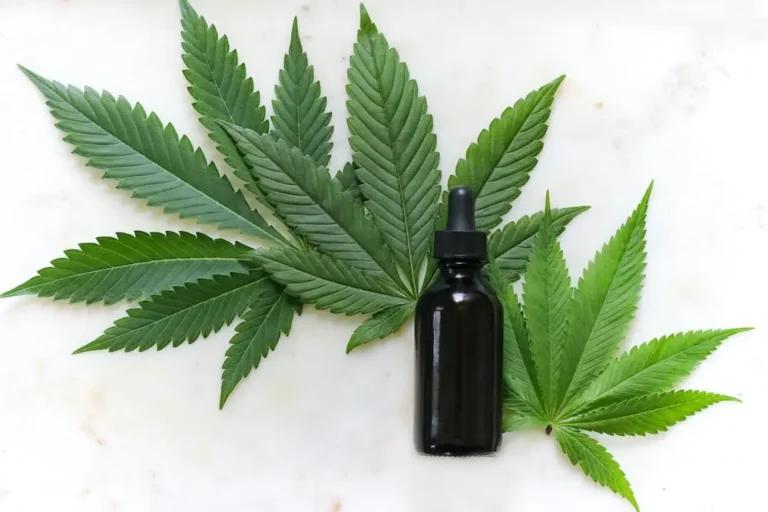
Cannabidiol (CBD) oil is a natural product derived from the cannabis plant. High in essential fatty acids, CBD oil provides numerous potential health benefits, including improved sleep, mood regulation and pain relief. Let’s take a closer look at how CBD oil works and why people are turning to it for help with their health issues.
What is CBD Oil?
CBD stands for cannabidiol, which is a chemical compound found in cannabis plants. It’s important to note that while CBD comes from cannabis plants, it does not contain tetrahydrocannabinol (THC) the psychoactive compound that causes the “high” associated with marijuana. As such, taking CBD oil should not cause any intoxicating effects. CBD oil may also contain trace amounts of other cannabinoids, as well as beneficial plant compounds such as terpenes and flavonoids. In addition to these naturally occurring components, some CBD oils may also contain carrier oils, such as coconut oil or hemp seed oil, to improve their consistency and absorption.
How does CBD Oil work?
CBD is one of more than 100 compounds found in the cannabis plant known as cannabinoids. Unlike THC, CBD does not produce any psychoactive effects when consumed. Instead, it interacts with the body’s endocannabinoid system, which helps regulate various bodily functions like mood, appetite and immune system response. This interaction can help balance out the body’s systems and reduce inflammation in the process.
What can CBD Oil do?
Evidence for cannabidiol health benefits
Thanks to its ability to interact with the body’s endocannabinoid system, cannabidiol has been linked to numerous potential health benefits.
Here are some of the most promising areas where it could make an impact:
- Anxiety and depression: Studies have shown that CBD oil may be effective in managing symptoms of both anxiety and depression. It works by activating receptors in the brain responsible for regulating mood and emotion. CBD oil is often used as an anxiety-reducing treatment, as it has been found to have anti-anxiety properties. Studies have shown that it can help to reduce stress levels, which can help people with certain types of anxiety disorders find relief from their symptoms. It has also been found to be useful in treating insomnia and other sleep problems
- Pain relief: There’s evidence that CBD oil can help reduce inflammation and chronic pain caused by a variety of medical conditions, including arthritis, fibromyalgia and cancer. Studies have shown that it can help to reduce inflammation, which can help pain management with conditions like arthritis or fibromyalgia. It has also been found to help treat acute injuries and muscle soreness
- Sleep aid: Research suggests that taking CBD before bedtime can help improve sleep quality and duration. It may work by reducing anxiety and calming the body down so you can fall asleep more easily
- Skin care: Some research suggests that topical application of CBD oil can reduce redness, irritation and other symptoms associated with skin conditions such as eczema and psoriasis. Studies have also shown that CBD oil can be beneficial for skin health. It contains antioxidants, which can help protect your skin from damage caused by free radicals and environmental pollutants. Additionally, it can help reduce inflammation and redness associated with acne and other skin conditions
- Heart health: Preliminary studies indicate that taking CBD may help lower blood pressure levels and reduce risk factors associated with heart disease
- Sexual satisfaction: a recent survey by Remedy Review concluded that that 68% of people who use CBD for sex reported a notable increase in their sexual satisfaction
It is important to note that more research is needed to better understand how these compounds work and their long-term effects on our bodies. Research investigating the effects of CBD on certain conditions is ongoing and there is still much to be learned about the potential uses of CBD. Until then, talk to your doctor about whether or not using CBD oil is right for you.
CBD in treating neurological disorders
Our understanding of the potential of CBD has grown rapidly in recent years, including its potential to treat a range of neurological disorders such as epilepsy, multiple sclerosis and Parkinson’s disease. This natural compound, derived from the cannabis plant is becoming increasingly popular for its therapeutic benefits. Many patients have found relief through the use of CBD, particularly when traditional medications have failed to provide adequate results.
You may be interested to know that clinical trials have shown the potential of CBD in alleviating symptoms related to these neurological disorders.
In terms of epilepsy, CBD is effective in reducing the frequency and severity of seizures in some cases. For those who have multiple sclerosis, CBD can help with muscle stiffness, pain and spasms. Additionally, preliminary research shows that CBD may also have the potential in relieving symptoms of Parkinson’s disease, such as tremors and rigidity, as well as improve the overall quality of life. However, it is vital to consult with a healthcare professional before considering the use of CBD as part of your treatment plan.
While there is still much to learn about the full potential and benefits of CBD as a treatment, the promising results witnessed so far offer a newfound sense of hope for many patients seeking alternative and more natural solutions for managing these challenging conditions.
How to take CBD oil?
The CBD market has seen rapid growth in recent years, providing a plethora of products to cater to the diverse needs of its consumers. There are now various forms of CBD products available to suit different lifestyles and preferences, including:
- Tinctures, which are highly concentrated liquid CBD that can be taken sublingually or added to food and beverages
- Creams and balms infused with CBD, designed for topical application to soothe sore muscles can be applied directly to the skin to address specific concerns
- Edible treats like gummies, cookies, and chocolate bars make it easy and enjoyable to incorporate CBD into the daily routine
- CBD vapes are perfect for those who enjoy inhalation as their method of consumption
- Bath bombs can offer a relaxing and rejuvenating bathing experience while absorbing the goodness of CBD
The versatility of these products ensures that there is something for everyone, offering a convenient and enjoyable way to experience the therapeutic effects of CBD. Depending on your condition and desired effects, your doctor may recommend a specific method of usage that best suits your needs. It is important to speak with your doctor before starting any new supplement or medication regimen so that they can ensure you are taking appropriate dosages at recommended intervals throughout the day.
What are the side effects of CBD?
When considering the use of CBD, it’s important to be aware of the potential side effects it may cause. Thankfully, most people find CBD to be well-tolerated and experience only minor side effects if any. However, it’s important to note that everyone reacts differently and some individuals may experience mild discomforts such as dizziness, dry mouth or diarrhoea after consuming CBD products. In some cases, CBD might also cause fatigue or changes in appetite. It’s essential to monitor your body’s response to CBD, especially when starting a new regimen or adjusting your dosage.
Always make sure to consult with a healthcare professional if you’re unsure about incorporating CBD into your regimen or if you’re experiencing adverse effects.
Are CBD oil and hemp oil the same?
While browsing various health and wellness products, you might have encountered CBD and hemp oil. Although CBD oil and hemp oil are derived from the same plant, Cannabis sativa plant, their similarities end there.
Many people unknowingly use these terms interchangeably, which can confuse. CBD oil is derived from the whole hemp plant including its stalk, leaves and flowers, making it rich in cannabinoids like CBD, as well as terpenes and flavonoids that can provide a variety of health benefits.
On the other hand, hemp oil, also known as hemp seed oil, is extracted solely from the seeds of the hemp plant. It contains high levels of omega-3 and omega-6 fatty acids, making it an excellent choice for culinary purposes and skincare products, but it does not contain substantial amounts of CBD.
It is essential to understand the difference between these two oils to ensure you choose the appropriate product for your needs while reaping the maximum benefits they can offer.
Is CBD legal in the UK?
Navigating the legality of CBD in the UK can be quite confusing for many people, given the rapidly evolving landscape surrounding cannabis and its derivatives. The good news is that CBD is indeed legal in the UK, as long as it comes from authorised industrial hemp strains containing not more than 0.2% THC (the compound responsible for the intoxicating effects).
To ensure safety and adherence to regulations, CBD products are required to undergo rigorous testing. CBD oil is not a controlled substance under the Misuse of Drugs Act and it can be sold in the UK as a food supplement if the seller does not make any claims about its medicinal properties. So, if you are in the UK and considering trying CBD for its potential wellness benefits, you can do so with peace of mind knowing that it is lawful and regulated.
What is medical cannabis?
Understanding the difference between medical cannabis and CBD oil is essential, especially when it comes to their use and benefits for our health.
Medical cannabis is a term used to describe the whole cannabis plant or its extracts, which contain various active compounds, including THC and CBD. THC, responsible for the psychoactive effect or the “high” associated with marijuana use, can be beneficial in certain medical conditions. On the other hand, CBD oil is derived from hemp plants and primarily contains the non-psychoactive compound CBD. It does not produce the “high” sensation mind-altering effects.
Essentially, medical cannabis provides a broader spectrum of relief due to the presence of various cannabinoids, whereas CBD oil offers targeted support with minimal psychoactive effects. As a patient, understanding these differences can better inform your healthcare decisions and allow you to choose the right option for your specific needs.
Specific cannabis-based products are available on NHS prescription as medicinal cannabis. These are only likely to benefit a very small number of patients and are prescribed to very few patients. A hospital specialist can only prescribe medical cannabis. You cannot get cannabis-based medicine from a GP.
Epidiolex can be prescribed by a specialist for patients with Lennox-Gastaut syndrome and Dravet syndrome (both severe forms of epilepsy).
Sativex can be prescribed for multiple sclerosis which can be sprayed into the mouth. It is licensed in the UK for adults with MS-related muscle spasticity that has not got better with other treatments.
Using CBD oil safely & effectively
If you’re considering using CBD oil to treat a specific condition or symptom, consult your doctor or pharmacist first for medical advice. They will be able to provide advice on how to use it safely and whether or not you should avoid any medications while taking it e.g. when taking opioid painkillers like morphine, CBD increases the effect of morphine. Additionally, they may be able to recommend a reputable brand that offers high-quality products.
When buying CBD oil online or in stores, always read labels carefully so that you know exactly what you’re getting, including the dose of CBD. Additionally, look for products that have been tested by third-party labs for purity and potency as this will ensure that you get a product that is safe and effective for your needs.
Sources
Medical Disclaimer
NowPatient has taken all reasonable steps to ensure that all material is factually accurate, complete, and current. However, the knowledge and experience of a qualified healthcare professional should always be sought after instead of using the information on this page. Before taking any drug, you should always speak to your doctor or another qualified healthcare provider.
The information provided here about medications is subject to change and is not meant to include all uses, precautions, warnings, directions, drug interactions, allergic reactions, or negative effects. The absence of warnings or other information for a particular medication does not imply that the medication or medication combination is appropriate for all patients or for all possible purposes.








